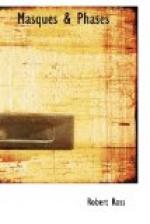To HERBERT HORNE, ESQ.
THE ELEVENTH MUSE.
In the closing years of the last century I held the position of a publisher’s hack. Having failed in everything except sculpture, I became publisher’s reader and adviser. It was the age of the ‘dicky dongs,’ and, of course, I advised chiefly the publication of deciduous literature, or books which dealt with the history of decay. The business, unfortunately, closed before my plans were materialised; but there was a really brilliant series of works prepared for an ungrateful public. A cheap and abridged edition of Gibbon was to have heralded the ‘Ruined Home’ Library, as we only dealt with the decline and fall of things, and eschewed Motley in both senses of the word. ’Bad Taste in All Ages’ (twelve volumes edited by myself) would have rivalled some of Mr. Sidney Lee’s monumental undertakings. It was a memory of these unfulfilled designs which has turned my thoughts to an old notebook—the skeleton of what was destined never to be a book in being.
I have often wondered why no one has ever tried to form an anthology of bad poetry. It would, of course, be easy enough to get together a dreary little volume of unreadable and unsaleable song. There are, however, certain stanzas so exquisite in their unconscious absurdity that an inverted immortality may be claimed for them. It is essential that their authors should have been serious, because parody and light verse have been carried to such a state of perfection that a tenth muse has been created—the muse of Mr. Owen Seaman and the late St. John Hankin for example. When the Anakim, men of old, which were men of renown—Shelley, Keats, or Tennyson—become playful, I confess to a feeling of nervousness: the unpleasant, hot sensation you experience when a distinguished man makes a fool of himself. Rossetti—I suppose from his Italian origin—was able to assume motley without loss of dignity, and that wounded Titan, the late W. E. Henley, was another exception. Both he and Rossetti had the faculty of being foolish, or obscene, without impairing the high seriousness of their superb poetic gifts.
But I refer to more serious folly—that of the disciples of Silas Wegg. Some friends of mine in the country employed a ladies’-maid with literary proclivities. She was never known to smile; the other servants thought her stuck up; she was a great reader of novels, poetry, and popular books on astronomy. One day she gave notice, departed at the end of a month, left no address, and never applied for a character. Beneath the mattress of her bed was found a manuscript of poems. One of these, addressed to our satellite, is based on the scientific fact (of which I was not aware until I read her poem) that we see only one side of the moon. The ode contains this ingenious stanza:—
O beautiful moon!
When I gaze on thy face
Careering among the boundaries of
space,
The thought has often come to my
mind
If I ever shall see thy glorious
behind.




